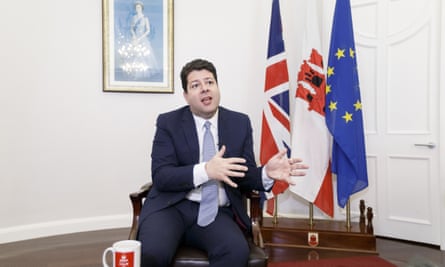The EU has put the future of Gibraltar at stake in the coming Brexit negotiations, in effect backing Spain in its centuries-old dispute with the UK over the British overseas territory.
After lobbying from Spanish diplomats, the EU’s opening negotiating position for the Brexit talks presents the British government with the choice of reaching agreement with the Spaniards about Gibraltar’s future or exposing its citizens to economic peril by pushing “the rock” outside any EU-UK trade deal.
“The union will stick up for its members and that means Spain now,” a senior EU official said. Residents of Gibraltar, which Spain has sought to reclaim almost since it was ceded to Britain in 1713, voted 96% to remain in the EU.

The announcement came towards the end of a nine-page draft document sent by the European council president, Donald Tusk, to member states on Friday outlining negotiating guidelines for the upcoming Brexit talks.
The guidelines, which will be refined at a summit of EU27 leaders at the end of April, ruled out talks on Britain’s future relations with the EU until “sufficient progress” had been made on agreeing the UK’s exit bill, securing citizens’ rights and dealing with Ireland’s border.
The draft document also said no future trade pact could be concluded before Britain had left the bloc, insisted existing EU regulations – including the jurisdiction of the European court of justice – must apply during any transition deal. It rejected sector-by-sector deals, saying they undermined the integrity of the single market.
A short guide to Gibraltar
Ever since the Anglo-Dutch fleet captured Gibraltar 313 years ago during the war of Spanish succession, the small territory at the southern tip of Spain has been a bone of contention between Madrid and London. Although British sovereignty was formalised by the treaty of Utrecht in 1713 and Gibraltar became a British colony in 1830, Spain has always bristled at the idea of UK ownership. Two referendums - in 1967 and 2002 - have shown that the overwhelming majority of residents wish Gibraltar to remain British. Despite accusations of double standards given its two enclaves in north Africa, Spain has refused to relinquish its claim.
The surprise clause gives Spain the ability to exclude Gibraltar from any UK-EU transitional single market access arrangement or future trade deal if it is not satisfied with the status of the territory.
It says that once the UK leaves the bloc “no agreement between the EU and the United Kingdom may apply to the territory of Gibraltar without the agreement between the Kingdom of Spain and the United Kingdom”.
This suggests that unless Britain is willing to let its citizens on “the rock” be subject to an inferior economic future than those in the UK, the EU has in effect handed the Spanish government a veto on Britain’s entire future relationship with the bloc.
A senior UK source with knowledge of EU negotiations said the clause was extraordinary because it effectively signalled a lack of total British sovereignty over Gibraltar. It gave Spain a greater say over the future of Gibraltar than the British government was likely to be willing to accept, the source said.
Another senior UK source with knowledge of both the EU and Whitehall said the government was not surprised to see the reference to Gibraltar in the document because it would have been a key demand from Spain, but suggested it was ominous.
The Gibraltar government said it had been “shamefully singled out” for unfavourable treatment by the European council at the behest of Spain.

“This unnecessary, unjustified and unacceptable discriminatory proposed singling out of Gibraltar and its people was the predictable machination of Spain that the people of Gibraltar foresaw and one of the reasons why we voted so massively to remain in the EU,” the chief minister, Fabian Picardo, said.
“This is a disgraceful attempt by Spain to manipulate the European council for its own, narrow political interests. Brexit is already complicated enough without Spain trying to complicate it further.”
Gibraltar’s MEP, Clare Moody, claimed Theresa May’s failure to mention Gibraltar in her article 50 letter, notifying the EU of the UK’s intention to leave, had emboldened the Spanish and signalled that London was not affording the territory the same importance in Brexit talks as Scotland and Northern Ireland.
Moody, who has represented Gibraltar in the European parliament since 2014, said: “It is appalling, and an example of the carelessness with which the government are handling these negotiations overall.”
In London, the Conservative MP Bob Neill said: “Gibraltar’s friends in the UK will be watching this very carefully. There will be no sellout.”
Andrew Rosindell, the vice-chair of the all-party parliamentary group for Gibraltar, said: “An agreement without including Gibraltar means there can be no agreement. British people must and will stand together, we cannot be bullied by Spain.”
On the Spanish side, Esteban González Pons, the vice-chair of the European People’s party, told El País newspaper that May’s failure to mention Gibraltar in the letter on Wednesday was “very relevant”, adding that the omission was “because Gibraltar isn’t part of the United Kingdom; it’s a colony like the island of St Helena”.
Sources in the his party close to the Spanish government told the paper: “This absence is a good sign because it heralds good news – that Gibraltar is an issue to be negotiated bilaterally in the future, only between Spain and the UK.”
British government sources pointed towards May’s comments in the House of Commons on Wednesday when she said the UK was “absolutely steadfast in our support of Gibraltar, its people and its economy”.
The prime minister said: “We have been firm in our commitment never to enter arrangements under which the people of Gibraltar would pass under the sovereignty of another state against their wishes, nor to enter into a process of sovereignty negotiations with which Gibraltar is not content.”
The article 50 letter was “a notification in relation to our withdrawing from the European Union”, May said. “Gibraltar is not a separate member of the EU, nor is it a part of the UK for the purposes of EU law, but we are clear that it is covered by our exit negotiations.”
The foreign secretary, Boris Johnson, wrote on Facebook on Friday night that he had called Picardo to tell the Gibraltar chief minister “that the UK remains implacable and rock-like in our support for Gibraltar. As the prime minister herself said earlier this week, we are clear that Gibraltar is covered by our exit negotiations and we have committed to involving Gibraltar fully in the work that we are doing.”
He also tweeted:
Good to speak to #Gibraltar Chief Minister @FabianPicardo. As ever, the UK remains implacable & rock-like in our support for Gibraltar
— Boris Johnson (@BorisJohnson) March 31, 2017
While Spain has long sought sovereignty, or at least co-sovereignty over Gibraltar, its more realistic aims will be to rid the territory of an airport and to ensure it is unable to maintain its 10% corporate tax rate.
Tim Farron, the Liberal Democrat leader, claimed May had made a “major strategic error” by not mentioning Gibraltar in her article 50 letter. “Gibraltar should not be hung out to dry by this government for the sake of a hard Brexit.”

A senior EU official said the remaining 27 member states expected the stipulation to remain in place when talks between the UK and the EU started at the end of May or early June.
“The text means what it says,” the official said. “Any extension of the deal [after withdrawal] to Gibraltar, which is a disputed territory, will require the support of Spain. Spain must approve the applicability of a future agreement to territory of Gibraltar. It recognises that there are two parties to this dispute.”
He added of the EU’s position on Gibraltar: “There is a difference. After Brexit is notified there is a union of 27 and only one side of that argument is represented.”
The day after Britain’s Brexit vote, Spain’s then foreign minister, José Manuel García Margallo, said the outcome had hastened the day when the Spanish flag would fly over the territory.
Although Margallo’s replacement, the Brussels veteran Alfonso Dastis, has softened Spain’s tone, the issue has remained firmly on the negotiating agenda. Spanish MEPs and diplomats are said to have been thrilled that May made no mention of Gibraltar in her article 50 letter.
On Wednesday, Picardo had insisted the government would fiercely oppose any Spanish moves to use Brexit negotiations as a means to gain more control over the territory. “Our sovereignty is not in play,” he told Gibraltar’s parliament. “We will be no pawn in Brexit and no victim of Brexit.”








